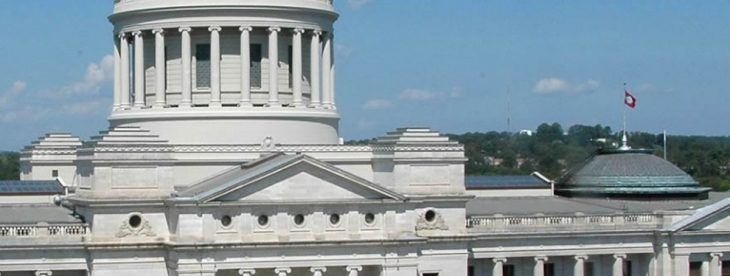Democrats surprise with an 11-9 majority on Arkansas House Revenue and Tax Committee
by November 10, 2016 7:07 pm 206 views

Democrats will control only 26 of the 100 seats in the House of Representatives in the next legislative session, but they will have an 11-9 majority on one of the most important committees, the House Revenue and Taxation Committee, after committee selections were made Thursday.
Democrats accomplished that feat by communicating as members were making their selections and then stacking that particular one, House Minority Leader Michael John Gray, D-Augusta, said Thursday.
The House has 10 committees: five more important “A” committees and five “B” committees. Republicans have large majorities in the other A committees: 17-3 in Education; 16-4 in Judiciary; 16-4 in Public Health; and 16-4 in Public Transportation, which has 10 freshmen.
But the Democrats’ control of Revenue and Tax could give them outside influence on Gov. Asa Hutchinson’s stated desire for a $50 million tax cut in the upcoming legislative session. Asked how that control could affect the tax cut, Hutchinson said through his spokesman, J.R. Davis, “I do not intend to get involved in the House committee selection process. They are a separate body of government, and I believe in the separation of powers and the checks and balances system that serve our country so well. I will continue to advocate for bipartisan support for both my balanced budget and the tax cuts that spur economic growth.”
House members met as a body Thursday to draw for seniority and then were divided according to the state’s four congressional districts to meet concurrently in four locations, Republicans and Democrats together. Members selected their committees one at a time based on seniority. Gray said Democrats went into the process hoping to gain a majority on one of the committees. As it unfolded, they communicated with each other and moved to stack Revenue and Taxation.
“We went in with trying to get one, and that one was the one that became attainable,” he said.
He said members were interested in being on that committee because tax policy will be an important issue in the upcoming session. Gray wouldn’t reveal what Democrats intend to do with their majority, saying they want to take a “reasonable and responsible look” at potential tax cuts. He wouldn’t say whether a tax cut would focus on lower or upper level income earners.
“If there’s a way to make things better for working families of Arkansas, we would be remiss not to take a long, hard look at that,” he said.
He also declined to say whether Democrats would use their majority as a bargaining tool.
“I guess that’s the nature of it, but I prefer to think that we’re going to have to work across the aisle with our friends on the other side, and so I wouldn’t call it horse-trading, but I think we really want to make sure that everybody’s priorities are at least discussed,” he said.
House Majority Leader Mat Pitsch, R-Fort Smith, said Republicans control nine of 10 committees and also control majorities on the three major joint committees selected today.
“They went to that direction, and we saw them going that direction,” he said of the Democrats. “We just didn’t get the communication, and again, that falls on me. We didn’t get the communication to the people in the 4th District, and they were able to get to their picks before we could get there in time to get it blocked.”
Among the B committees, Republicans have a slim 11-9 majority on the Aging, Children and Youth, Legislative and Military Affairs Committee, which Gray said would give Democrats more influence in foster care and veterans issues. The other B committees are solidly Republican. Agriculture, Forestry and Economic Development is 14-6; City, County and Local Affairs is 16-4; Insurance and Commerce is 15-5; and State Agencies and Government Affairs is 18-2.
Among the joint committees, 12 Republicans and eight Democrats were named to the Arkansas Legislative Council, which serves as a policymaking body between legislative sessions. The ALC also includes 12 ex-officio members, including the speaker of the House, along with 20 first alternates and 20 second alternates.
The partisan breakdown on the Joint Budget Committee is 20-4, with four ex-officio members and eight alternates. The Legislative Joint Auditing Committee is divided 15-5, along with four ex-officio members, 20 first alternates and 20 second alternatives.
